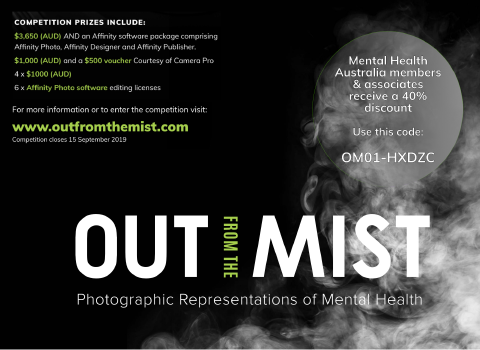Creative prevention
This week saw the release of the latest Household, Income and Labour Dynamics in Australia Survey.
In their own words:
“The Household, Income and Labour Dynamics in Australia (HILDA) Survey is a household-based panel study that collects valuable information about economic and personal well-being, labour market dynamics and family life. It aims to tell the stories of the same group of Australians over the course of their lives.
Started in 2001, the HILDA Survey provides policy-makers with unique insights about Australia, enabling them to make informed decisions across a range of policy areas, including health, education and social services.”
News outlets have been reporting on the findings all week, and amongst the headlines a range of issues touched directly on mental health:
More Australians are diagnosed with depression and anxiety but it doesn’t mean mental illness is rising
Longtime friend of Mental Health Australia, Professor Emeritus Tony Jorm, penned the above article in The Conversation that detailed some of the challenges of interpreting the kind of information that the HILDA report details.
For instance, on the face of it, the report shows that anxiety and depression in young women (aged 15-34) increased from 12.8% in 2009, to 20.1% in 2017.
But as Professor Jorm also points out, this could reflect an increase in the diagnosis of these conditions, or an increase in their actual incidence, or some combination of the two. More information is needed to make sense of the data.
Then once we know the rate of diagnosis, and the actual incidence, it is still challenging to work out the impact of treatment. Have the treatments worked, and reduced incidence, severity and duration? Would things have been worse without those interventions? Or have those interventions, or some of them, been effectual?
Regardless of our answers to those questions, Professor Jorm also observes that “prevention has been neglected” in spite of the fact that “there is now good evidence that prevention of mental-health problems is possible and that it makes good economic sense.”
Other headlines make clear just how challenging some of that prevention will be, but also how rich the opportunities are to intervene in peoples’ lives in creative ways that can prevent mental health issues from arising in the first place.
I reflected on one such creative example when I came across this reported HILDA finding:
Australian city workers’ average commute has blown out to 66 minutes a day
It’s Official: Aussie Work Traffic Is A Nightmare
I can still remember the personal impact that moving from Melbourne to Canberra 20 years ago had for me and my family.
I went from a 60+ minute commute, each way, from Melbourne’s outer suburbs to the city (2 hours each way if the public transport broke down), to what was essentially a 20 minute drive in the beautiful bush capital when I got to Canberra.
I still recall the impact this had on me, my partner, and my young children. The time the shorter commute gave back to me could now be spent on time together, personal fitness, longer rest, recreation activities, shared parenting – all positive factors for my own mental health.
I recognise the privilege that my personal circumstances afforded me, but it also reinforced for me that when we think ‘prevention’ we need to think very broadly and creatively. We need to think about the built environment, the natural environment, urban infrastructure – roads and rail, and all of those many other factors that contribute to mental and physical health: exercise, diet, sleep, early childhood development etc.
As we get closer to the release of the Productivity Commission’s Draft Report into Mental Health in early November, the evidence suggests that our approach to preventing mental health issues will need to be considerably broader than it has been to date, and that taking such an approach has very substantial potential to achieve long term benefits.
Warm regards,

Frank Quinlan
Chief Executive Officer
Submission to the Productivity Commission Inquiry into Mental Health - Intergovernmental Arrangements
This week, Mental Health Australia’s third submission to the Productivity Commission Inquiry into Mental Health was made available on the Mental Health Australia website. This submission is a discussion piece around the issues underlying the current intergovernmental arrangements and outlines some options to improve them.
In particular, the submission argues for the implementation of a new National Mental Health Agreement drawing on lessons learnt from the Productivity Commission’s own review of the current National Disability Agreement. In addition, it explores funding models that enable greater collaboration between services, sectors and portfolios to enhance a focus on outcomes in mental health.
Please click here to read the full submission.
|
Household, Income and Labour Dynamics in Australia (HILDA) Survey released
The Household, Income and Labour Dynamics in Australia Survey, known as HILDA, is a nationally representative longitudinal study of Australian households. It is funded by the Australian Government through the Department of Social Services and is managed by the Melbourne Institute. The Melbourne Institute publishes the latest findings from the HILDA Survey each year, allowing Australians to see how different aspects of their lives have changed over time.
Read more
Youth mental health facility opens in Parkville, Victoria
Premier Daniel Andrews and Minister for Mental Health Martin Foley this week opened the cutting-edge new youth mental health facility in Parkville, which will focus on prevention and early intervention and will support 5,000 young Victorians each year. The Labor Government invested $60 million in the new facility on Poplar Road, which is home to Orygen, the National Centre of Excellence in Youth Mental Health and the Orygen Youth Health program.
Read more
Minister delivers first round of NDIS data as part of new transparency
The first round of National Disability Insurance Scheme (NDIS) data has been released as part of the Morrison Government’s commitment to demonstrate full transparency of the NDIS. Minister for the National Disability Insurance Scheme, Stuart Robert, this week released data collected directly from participants, their families and carers and providers.
Read more
Tasmanian Mental Health Southern Integration taskforce recommendations
The Hodgman majority Liberal Government will establish a Mental Health Hospital Avoidance Program in southern Tasmania, as part of a new approach to improve the integration of mental health supports and services. The Mental Health Southern Integration Taskforce was established in 2018 to explore world best practice for the integration of mental health services. The Taskforce included representation from clinicians for inpatient and community mental health services, GPs, consumer peak bodies, unions, and, importantly, those who have lived experience with the mental health system in southern Tasmania.
Read more
|
|
|
|
On Tuesday, our Director, Policy and Projects Harry Lovelock will be attending a working group with the NDIA to discuss the outcomes of Mental Health Australia’s NDIS Optimising Psychosocial Support project.
On Wednesday, myself and some other Mental Health Australia staff will be attending the National Press Club to hear Beyond Blue CEO Georgie Harman, Director of ConNetic John Mendoza, and Head of the Centre for Mental Health Research at the ANU Luis Salvador-Carulla.
On Thursday, I will be meeting with Richmond Fellowship Tasmania, and also on Thursday will be catching up with the Co-Chairs of the National Mental Health Consumer and Carer Forum.
|
|

The Australian Psychological Society strongly advocates for the discipline and profession of psychology, supports high standards for the profession, promotes psychological knowledge to enhance community wellbeing, and is dedicated to providing benefits to support members’ professional lives.
The functions of the APS are conducted through more than 201 active Member Group within the Society. There are 40 APS Branches spread across Australia, nine APS Colleges representing specialty areas within the profession (clinical neuropsychology, clinical psychology, community psychology, counselling psychology, educational and developmental psychology, forensic psychology, health psychology, organisational psychology and sport and exercise psychology), and 48 Interest Groups representing the wide range of special interests of the APS membership.
Website - www.psychology.org.au Facebook - https://www.facebook.com/AustralianPsychologicalSo…Twitter - https://twitter.com/AustPsych

Central Coast Family Support Services Inc. was established in 1985 and is a not-for-profit community based service supporting families on the Central Coast of NSW. Their programs consist of:
• Family Support Home Visiting Program for families in the Gosford local government area with children 0 – 12 years.
• Young Parent Program for young parents and parents to be aged 13 – 19 years, covering the Central Coast.
• Early Intervention Disability Family Caseworker for families who have a child 0 – 8 years with a diagnosed disability, covering the Central Coast.
• Grandparent Support Program for grandparents who are the primary carers of their grandchildren, covering the Central Coast.
• Parenting Educative Program for families with children 0 – 8 years, covering the Central Coast
Vision - Central Coast Family Support Services Inc. is committed to a safe and just world in which difference is respected, learning is reciprocal and everyone has the opportunity to reach their full potential.
Website - www.ccfss.org.au Facebook - www.facebook.com/CentralCoastFamilySupportServices
|
|
Out from the Mist photographic competition
Out from the Mist, a unique photography competition about mental health, aims to disrupt the dominant stereotypes of mental illness through showcasing photographs by people with mental illness, and those close to them, including friend, families and carers.
The competition, a world first, closes on 15 September, and aims to capture the breadth of people’s diversity, from the experiences of pain and suffering, caring and empathy for loved ones, through to the elation of conquering obstacles.
The competition has around $10,000 in prizes, mostly cash, and will exhibit around 100 photographs in Brisbane City Hall and Queensland University of Technology’s Creative Arts Precinct in Kelvin Grove, inner city Brisbane, during Mental Health Week.
All stories are valid and welcome: the competition aims to showcase the strengths and the travails, the joyous moments and the sad, of those who directly or indirectly confront the challenges of mental illness.
Mental Health Australia members and associates receive 40% entry fee using code OM01-HXDZC.
Read more
Employee Assistance Professional Association of Australasia conference
The EAAPA conference theme for 2019 is “Staying on Top of Mental Health in the Australasia Workplace.” It will be held at The Mint, Sydney, from the 15-16 August.
Topics include:
- Inter-generational communication at work
- Pressure of a high performer: EAP and performance – assisting those presenting to be their best
- Responding to disasters
- How to measure critical incident outcomes
- New Zealand terrorist attack
- Understanding gender Diversity: Practical insights to assist trans clients
- Tools for overcoming barriers to workplace inclusion
And many more.
Register here
Read more
|
|


![]()






